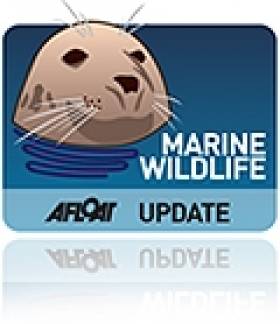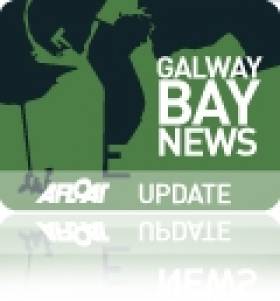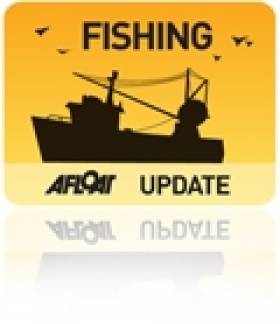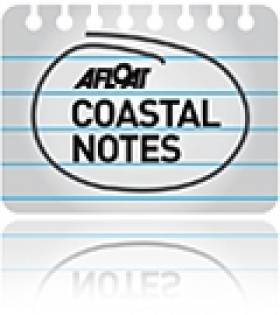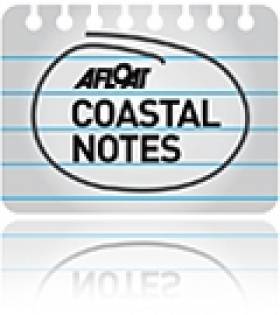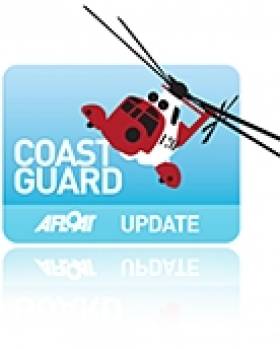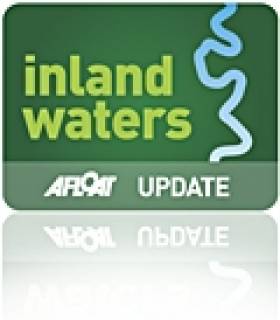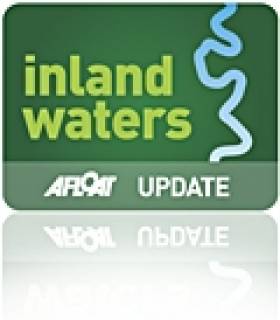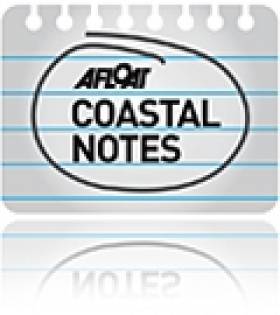Displaying items by tag: pollution
Baltimore Whale Carcass Creating 'Rancid Oil Slick' in Conservation Area
#BALTIMORE WHALE - Nine weeks after the tragic demise of the Baltimore Harbour fin whale, its carcass is still afloat off West Cork, creating a “rancid oil slick” in a special conservation area, according to a local resident.
Tom McCarthy contacted Afloat.ie with the above image of the 65ft whale carcass, which was towed out to the grey seal breeding ground off the Carthys Islands in Roaringwater Bay and has apparently been left to rot.
“It has been left here since the middle of August to decay,” says Tom. “The rancid oil slick is clearly visible and extends for over 1km on relatively still days, the smell is horrendous."
As previously reported on Afloat.ie, plans were afoot to sink the fin whale carcass that was trapped in Baltimore Harbour in mid-August and endured a harrowing few days trapped in Baltimore Harbour before it died from what's presumed to be a combination of illness and injury.
Tom McCarthy claims that the National Parks and Wildlife Service (NPWS) has washed its hands of the situation, considering the enormous marine mammal carcass to be a natural occurrence "even though the animal beached and died several miles [away and] was wrapped in a net and towed to its final resting position".
The location is in a Special Area of Conservation - yet according to Tom, no risk assessment appears to have been carried out beforehand.
"Ten minutes on the internet would show that whales are perhaps the most contaminated animals in the world," he says. "Their blubber is contaminated with persistent organic compounds such as PCBs, DDT, dioxins, etc and the internal organs such as the liver and kidneys are 'high', 'very high' or 'staggeringly high' in mercury, cadmium, chromium, etc.
"Some beached whales are found to be so contaminated the whale itself has to be considered as hazardous waste and disposed of as such."
Tom notes that the area is fished extensively for shrimp, crab, lobster and pollock, and that the rotting carcass is in close proximity to several mussel farms.
"It seems inevitable that as the whale continues to decay and is eaten whatever contaminants were present prior to death will re-enter the food chain."
He compares the current situation to a similar whale carcass disposal in Sligo last year, where the flesh was cut off and sent for incineration while the bones were marked for later skeletal recreation and sent for composting.
Regarding the West Cork whale carcass, Tom says: "Some estimates say it will take three years for the whale to completely decay."
Tom adds that he has been in contact with Cork County Council and hopes to hear on Monday about plans for a more appropriate method of disposal for the whale carcass.
Raw Sewage Outfall Concern for Galway Residents
#GALWAY BAY - Galway residents are voicing fears over pollution in Galway Bay due to alleged increase in outfalls from the city's sewage system.
As Galway News reports, locals in the Claddagh area spotted a discharge of raw sewage into the Claddagh Basin in July, which was confirmed by City Councillor Catherine Connolly to be an outfall.
Such releases are triggered automatically, like a safety valve, in emergency circumstances, such as after heavy rainfall which backs up the system.
Cllr Connolly has expressed her concern over an increase in the number of such releases over recent months, and their potential contribution to the degradation of water quality in the area - especially following the temporary closure of Grattan Beach in Salthill last month due to E.coli contamination.
She has also called for a report from the council on the difficulties experiences at the Mutton Island water treatment plant resulting from the inflow of grease and fats into the system from hotels and restaurants.
Galway News has more on the story HERE.
Fish Farm Delays Not 'Inexplicable' Say Environmental Campaigners
#FISHING - Environmental campaigners have lambasted the IFA's claims of an "inexplicable delay" in the State's processing of licence applications for fish farms.
In a letter to The Irish Times yesterday, Tony Lowes of Friends of the Irish Environment says that the delay – to allow for proper environmental studies to be conducted – "has been explained again and again" by Minister for the Marine Simon Coveney.
He was responding to a letter last Friday by Richie Flynn of IFA Aquaculture, who highlighted the "suffering" of coastal communities as a result of processes that "hamper development and delay investment in the hundreds of companies involved in farming salmon, oysters, mussels, trout and other species".
Lowes writes in counter that salmon farming "is a highly polluting industry", and that discharge of nitrogen and phosphorous from aquaculture facilities "can fuel toxic algae blooms, which have cost the shellfish industry dear".
He claims that the proposed salmon farm in Bantry Bay in West Cork would have a nitrogen and phosphorous discharge "equivalent to the sewage of a town 10 times the size of Bantry".
Lowes also alleges that the deep-sea "super salmon" farm in Galway Bay - the licence application for which is undergoing statutory consultation till 2 October - would produce the equivalent effluent of a city more than double the size of Galway.
In addition, he makes reference to the threat to native salmon in Irish rivers through sea lice infestations.
"The EU habitats directive requires baseline studies and environmental impact statements," writes Lowes. "Licensees can be granted only if the project will not have adverse impacts on protected species and habitats."
Balbriggan Beach Reopens After E.coli Scare
#COASTAL NOTES - The Irish Times reports that Balbriggan Beach was reopened for swimming yesterday 31 August after the latest in a string of E.coli scares around the Irish coast.
The beach at the north Co Dublin coastal town was closed to bathers after a pumping station malfunction caused raw sewage to be pumped into the sea for up to 24 hours earlier this week.
E.coli levels were subsequently recorded at five times the maximum EU safety limit, and as much as 100 times the Blue Flag standard for European beaches.
The incident raised concerns among campaigners opposed to the proposed new water treatment 'super plant' for Fingal.
As previously reported on Afloat.ie, worries have been expressed by locals in the towns of Skerries, Loughskinny and Rush about the effects of the planned outfall pipe in their area.
The Balbriggan swimming ban marked the second beach closure in north Dublin during August, after the waters at Rush South were found to be contaminated with E.coli over the bank holiday weekend.
A bathing ban was also imposed on seven beaches in Cork last month due to high levels of the bacteria, while a breach of safe levels at Salthill in Galway last week caused concern ahead of tomorrow's Ironman 70.3 triathlon.
Cork Beach Bathing Ban Lifted as E.coli Levels Drop 'Significantly'
#COASTAL NOTES - The bathing ban imposed last week on seven Cork coastal beaches has been lifted, according to RTÉ News.
As previously reported on Afloat.ie, the seven beaches had been closed to swimming over concerns at elevated E.coli levels in the water, resulting from water runoff after the recent heavy rainfall in the county.
Cork County Council took the decision to lift restrictions after tests this week showed E.coli levels had "significantly descreaed" below the EU mandatory safety level.
The seven affected beaches included three in the Youghal area. Redbarn at Youghal joins Garretsown near Kinsale and Garryvoe in the beaches that can fly their Blue Flags once more.
#COASTGUARD - The Irish Coast Guard is ill-prepared to respond to any major pollution incident off our coastline, according to a report commissioned by the Government.
As Lorna Siggins writes in The Irish Times on Friday, the report identified weaknesses in communication within the coastguard and in the training of volunteer crews, as well as deficiencies in the Marine Survey Office.
Minister for Transport Leo Varadkar, whose office commissioned the 'value for money' studies, said he would begin an action plan due in October to deal with such issues, which may require "tough decisions" - including the closure of a coastguard radio station at Malin or Valentia.
The studies by Fisher Associates highlighted the lack of a dedicated polluton control team within the coastguard, despite staff having "sufficient knowledge to respond".
Auditing of various pollution response plans was also found to be lax, while problems were also identified in management and training of the coastguard's 1,000 volunteers.
The Irish Times has more on the story HERE.
Environment Award for NI Angling Club
#INLAND WATERWAYS - The Tyrone Times reports that Clogher and District Angling Club has been awarded £1,000 (€1,196) by the Northern Ireland Environment Agency (NIEA) for an environmental project with local schools.
The Water Environment Community Awards recognised the club for its work with St McCartan's Primary School in Clogher and Augher Central Primary School to "investigate the signs and impact of pollution in the River Blackwater" over the coming months.
“Clogher and District Angling Club have demonstrated their commitment to protecting and improving their local water environment," said the NIEA's Dave Foster.
"I hope that their efforts over the next few months will inspire others to do their bit too and I would urge people to follow these projects and share what they see.”
#NEWS UPDATE - The Irish Petroleum Industry Association (IPIA) has proposed a suite of measures aimed at tackling the problem of illegal diesel washing in Ireland.
In a statement, the industry body for Ireland's fuel industry says that the practice is costing the Exchequer as much as €155 million annually in lost fuel duty.
"While other jurisdictions have to tackle this sort of fraud, the sheer scale of criminal washing of diesel is a particularly Irish disease," it said.
The IPIA's recommendations include the introduction of "a strong regulatory regime" to control the sale of rebated fuel, a new market for off-road diesel that is harder to disguise or remove, the closure of unlicenced filling stations, and a "radical overhaul" of the currently "absurd" penalties for offending retailers.
The Irish Angling Development Alliance (IADA) has fully backed the IPIA's proposals, citing the dangers of toxic waste byproducts from diesel washing operations.
"This toxic waste has been dumped illegally across the country, where it can enter the water table, not only seriously polluting water courses but also clean drinking water supplies."
NI Officials Investigate Fish Kill in Newtownabbey
#INLAND WATERWAYS - Officials at the Northern Ireland Environment Agency (NIEA) are attempting to find the source of a pollutant that resulted in a fish kill on the Threemilewater river in recent weeks.
The Newtownabbey Times reports that more than 120 trout and salmon parr have been found dead on the short stretch of river between Mossley Mill and Doagh Road in Newtownabbey, Co Antrim.
John Webster of the Threemilewater Conservation and Angling Association speculated that the pollutant may have entered the water from any of a number of pipes that flow into the waterway near the railway line at Mossley Mill.
He described the fish kill as "an absolute diasaster", especially coming as it did at the opening of the fishing season on 1 March.
The Newtownabbey Times has more on the story HERE.
Details Sought on Noise Levels Over Proposed Larne Lough Gas Plant
#LARNE LOUGH - Larne Council has looked into the concerns of local residents over a proposed £250 million (€300 million) natural gas plant at Larne Lough, the Larne Times reports.
Islandmagee Storage Limited (IMSL) has applied for planning permission for a 500 million cubic metre natural gas storage facility in Permian salt beds almost a mile beneath the lough, which is claimed would satisfy the North's peak demand for gas for over 60 days.
But locals have spoken out with their fears over noise levels, health and safety, pollution and the potential effect on tourism in the area.
Larne Council’s environmental health department carried out its own research into the proposed facility, taking these concerns into consideration.
It found that there was "no huge issue in terms of noise levels" where similar facilities are established throughout the UK and that the effect on tourism would be negligable.
However the department was “not yet happy” with data supplied by IMSL regarding noise levels and would be seeking more detailed information.
The Larne Times has more on the story HERE.




























